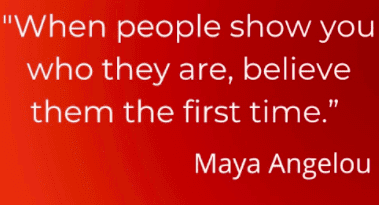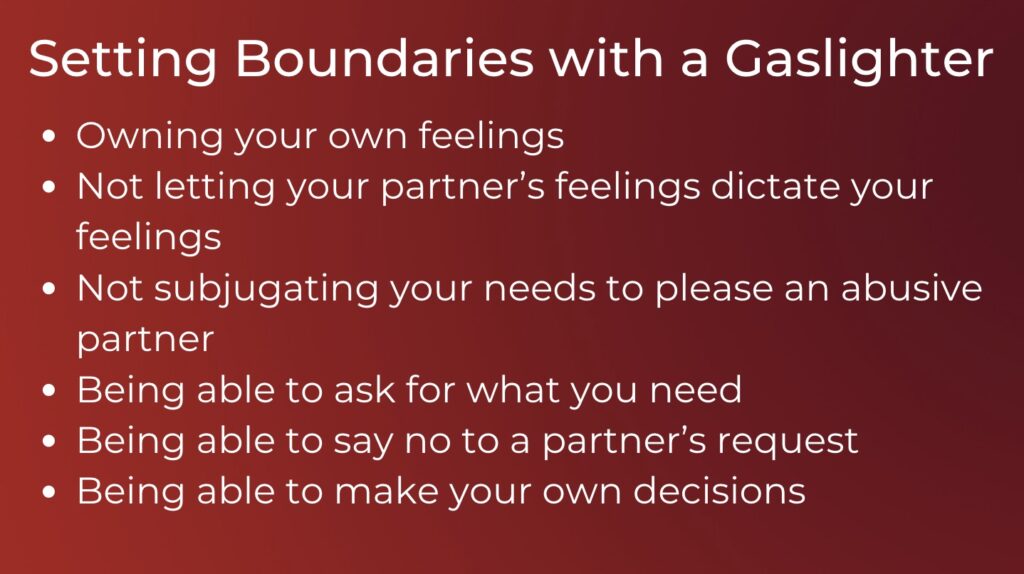Acknowledge You’re Being Gaslighted

In a book club discussion in 1997 with author Maya Angelou, Oprah Winfrey noted a lesson she learned and acknowledged having to continue relearning during her lifetime. Angelou summed up Winfrey’s lesson as this: “When people show you who they are, believe them the first time.” Read that again. “When people show you who they are, believe them the first time.”
I also suggest calling a gaslighting partner on their bullshit, as Lady Gaga did years ago with someone she dated. Yes, even Lady Gaga has had the misfortune of dating an emotionally abusive jerk. This clueless and nasty cad told her she would never succeed, never be nominated for a Grammy, and never have a hit song, and said he hoped she would fail. In response to those emotionally abusive words, she declared—as only Lady Gaga could—“Someday, when we’re not together, you won’t be able to order a cup of coffee at the f***ing deli without hearing or seeing me.” If you have dealt with or are currently in a relationship with an emotionally abusive person, you are not alone. It is not your fault. Plenty of strong, badass women have experienced emotional abuse.
When someone treats you poorly in the dating process or demonstrates that they have a mean streak in the early days of your relationship, pay attention. They are showing you who they are. If they tease or belittle you and then accuse you of being “too sensitive,” pay attention—they are showing you who they are. If a partner uses foul language or calls you vulgar names when you have conflict, pay attention—they are showing you who they are. These behaviors typically do not get better with time. They do not go away. Instead, they tend to escalate to either being more frequent or more egregious forms of intimate partner violence and, which include financial abuse, sexual abuse or coercion, physical abuse, and stalking. Recognize their behavior and bravely acknowledge it for what it is – emotional abuse.
Do Not Keep the Gaslighting a Secret
“We are only as sick as our secrets” is a motto of Alcoholics Anonymous. If you suspect your partner or someone else close to you is engaging in gaslighting behaviors, consider sharing those concerns with a trusted friend. It can be challenging to know if you are being gaslighted. It can feel risky or threatening to share with someone what your partner said or did to make you question your own reality. I will not lie to you—sharing these types of experiences with a friend is embarrassing and excruciatingly difficult.
However, traumatic experiences are more harmful when we feel compelled to hide them or keep them a secret. Have no doubt, being regularly emotionally or psychologically abused by a partner is traumatic. This is the person you have chosen above all others. The one in whom you are supposed to be able to confide in and go to when the world doesn’t make sense or you have had a setback and need comfort or encouragement. You trust them, or at least you probably did at one time, and acknowledging to yourself and to others how they are treating you can be scary and painful. We may be inclined to keep it a secret because we think the secret is our fault. Remember, if someone abuses you, it is never your fault.
Bessel van der Kolk, a renowned expert in trauma and in healing from traumatic experiences, notes in his seminal book The Body Keeps the Score, “As long as you keep secrets and suppress information, you are fundamentally at war with yourself.” In some ways, you may be silently at war with the gaslighter, but you do not need to add being at war with yourself to the mix! Keeping gaslighting experiences a secret due to shame, guilt, or embarrassment only prolongs and intensifies those experiences. Keeping secrets also makes us very tired. I kept the gaslighting I experienced a secret for too long, and it made the healing and recovery process that much longer and more difficult. Sharing your suspicion about being gaslighted or otherwise emotionally abused with someone you trust may also be frightening or stressful because once you share those accounts with someone, there may be implications for what you do next in response to that trusted friend’s reaction. However, confiding in a trusted person about that secret helps you get support, helps you cope with the abuse secret, and improves your well-being.
The Ripple Effect
If you determine that your partner is gaslighting you, especially regularly, it is important to recognize that you may not be the only one affected by those actions. If a gaslighting spouse engages in those behaviors in front of your children, they too may be pressured or manipulated into questioning their own reality or denying a reality they know exists. In her insightful and frank book Bird by Bird, author Anne Lamott notes how this may happen to many of us as children when she writes, “If you asked innocently, ‘Why is Mom in the bathroom crying?’ you might be told, ‘Mom isn’t crying; Mom has allergies.’ Or if you said, ‘Why didn’t Dad come home last night?’ you might be told brightly, ‘Dad did come home last night, but then he left again very early.’”
You knew these statements were not true, but as a child who depended on certain adults for food, shelter, and comfort, you had little choice but to pretend the reality was what that parent said it was. Further, the impact of gaslighting on you may cross over to impact your children through less engagement with them (e.g., fewer instances of reading the child stories, playing outside in the yard or at a park, playing inside together, taking the child on an outing such as to a restaurant or museum, or watching TV or a video with the child) even up to five years after the abuse.
If You Choose to Remain In the Relationship
If you choose to remain in the relationship, insist upon your partner getting counseling—both on their own and together with you as a couple. In other words, make it clear that the only way you will stay in the relationship is with long-term therapy. Negative or destructive relationship dynamics do not change quickly or without consistent and committed work. The effects of emotionally abusive relationships do not fall away quickly. Many who are gaslighted feel compelled to make excuses for their partner or loved one’s behaviors. Perhaps they are stressed at work, depressed, anxious, or dealing with a health issue. They are still accountable for their behavior. Their behavior is not on you. Be vigilant in taking responsibility for your behavior but not for your partner’s behavior.
In working with a therapist, learn how to set emotional boundaries in your relationship. When we fail to set boundaries, we give up our power. When we give up our power, we feel more helpless and eventually may come to see ourselves as helpless. Examples of setting boundaries include:

- Owning your own feelings
- Not letting your partner’s feelings dictate your feelings
- Not subjugating your needs to please an abusive partner
- Being able to ask for what you need
- Being able to say no to a partner’s request
- Being able to make your own decisions
If you feel as though you have lost your own identity or feel powerless in your relationship, you may not be setting and holding firm to important boundaries in that relationship. This can lead to your partner calling most or all of the shots in the relationship and having power or control over your health and happiness. It is your responsibility to set boundaries in all of your relationships. Only you can do that. You cannot fix a gaslighting partner. Only your partner can change their behavior, and you are not responsible for their behavior. Do not let a gaslighting partner define your self-worth or try to make you responsible for their choices.
If you determine you are being gaslighted, especially by a romantic partner on a regular basis, there are several tactics you can engage in to survive. First, resist. As much as you can, embrace the reality that you know or can verify. This may include getting angry about being gaslighted. That is okay. Angry women can change the world.
Second, recognize and connect with the fact that a gaslighter or otherwise emotionally abusive romantic partner is unlikely to admit to what they are doing, much less take ownership for how their behavior affects you. The entire goal of gaslighting and other emotional abuse is to control you or have power over you, and if they admit to poor behavior, that control evaporates.
Third, accept that the gaslighter is unlikely to change. You think and hope and wish that if you are nicer, do favors for them, apologize more, and walk on eggshells, things will change. People with a strong need for control who achieve some level of power in a relationship are highly unlikely to give up any of that power, and thus they will not stop gaslighting you, because doing so could mean a loss of power and control. This is unacceptable and perhaps even unthinkable to someone who engages in gaslighting.
Bottom line: Acknowledge the gaslighting for what it is – emotional abuse. Do not keep gaslighting behaviors a secret. Get individual counseling to help you protect your wellbeing if you choose to stay in the relationship. Insist on couple’s counseling. Set boundaries in the relationship and hold fast to them. Use your anger to enforce healthy boundaries.






